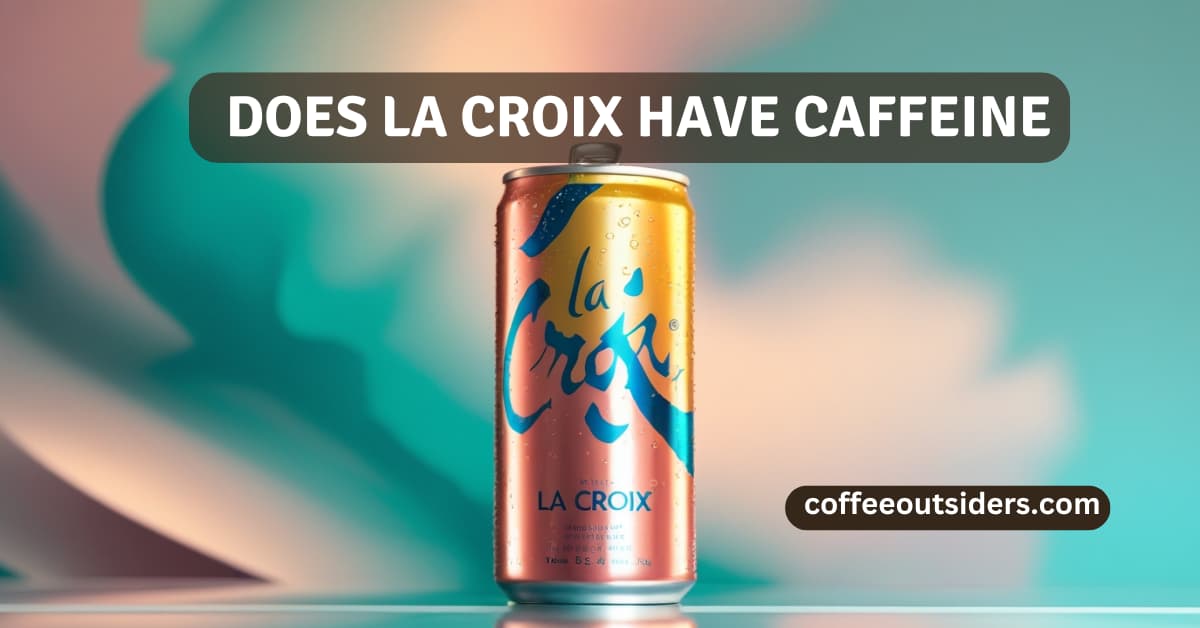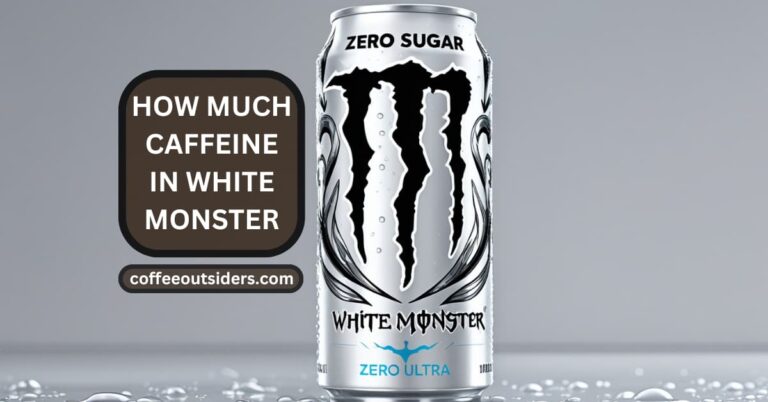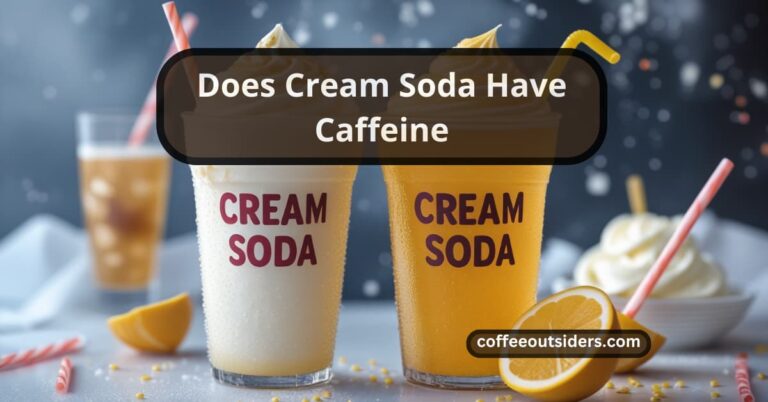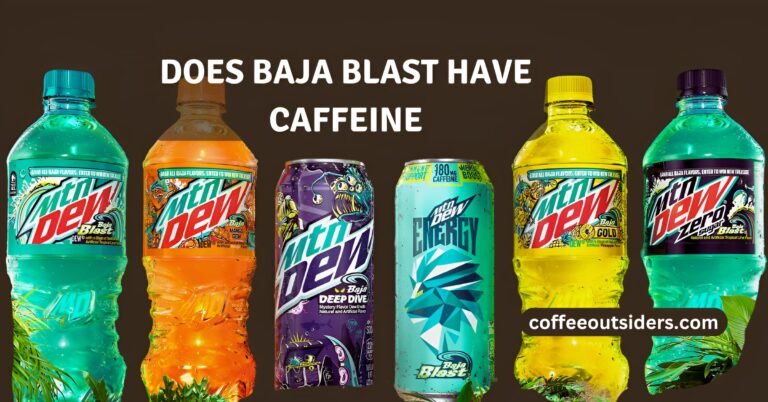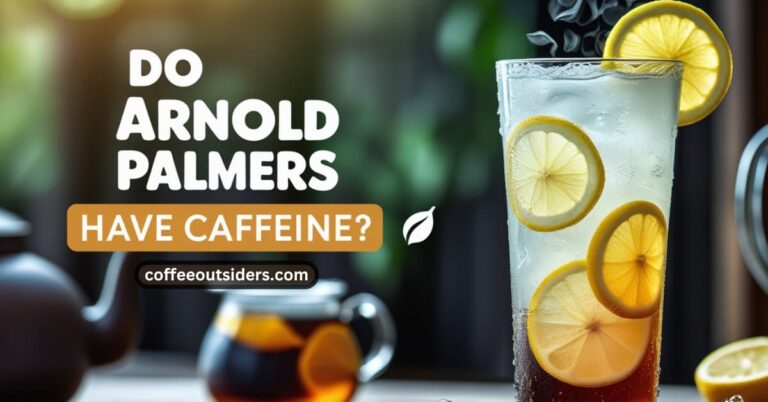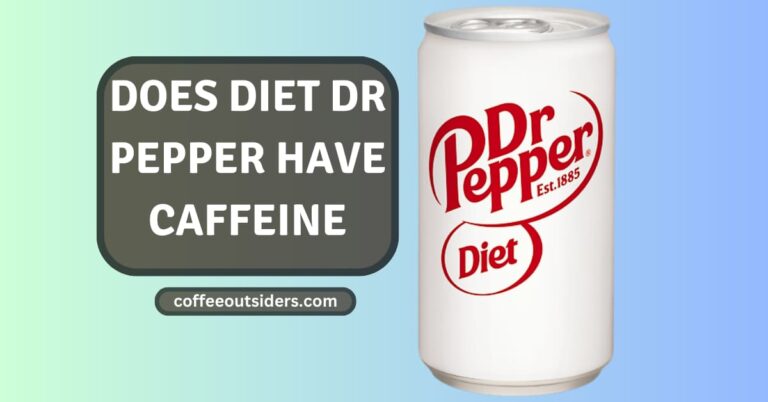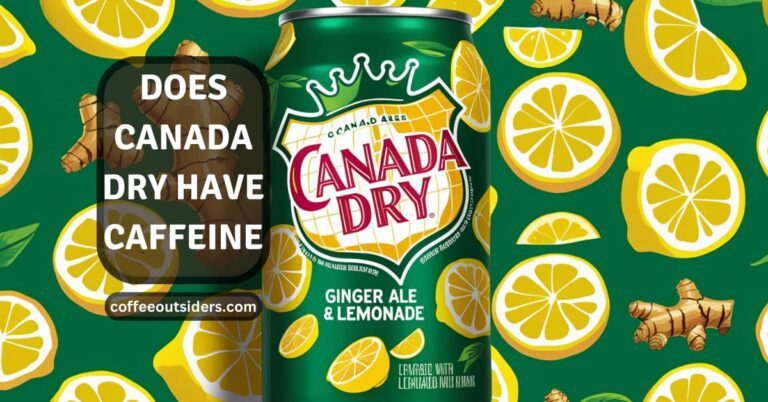Does La Croix Have Caffeine? My Experience and Insights
One of the most recognized sparkling water brands, La Croix recently became hugely popular, thanks in part to its huge array of flavors and zero-calorie, refreshing taste. An even better question, is whether or not it has caffeine. The short answer to that question is very simple—no, La Croix does not have any caffeine.
It’s made with carbonated water and natural flavoring, which makes it a caffeine-free beverage option. This makes it an excellent choice for people looking for a delicious beverage without additional caffeine or sugar.
- There’s no caffeine in La Croix. It’s the ideal option for those looking to cut out stimulants and refresh with a drink that won’t keep them awake.
- Its short ingredient list—carbonated water and natural flavors—means you’re enjoying a crisp beverage without any artificial ingredients or sweeteners.
- Choosing caffeine-free drinks like La Croix can support better sleep, reduce anxiety, and avoid the negative side effects linked to caffeine consumption.
- La Croix prioritizes health and sustainability by using high-quality water sources, natural fruit essences, and advanced filtration methods for purity.
- The market for non-caffeinated sparkling waters has exploded. Health-conscious consumers today have delicious and revitalizing choices beyond sugary or caffeinated beverages.
- You’ll love these fan-favorite, caffeine-free replacements for La Croix. Brands such as Bubly, Perrier, Spindrift, and Topo Chico have many flavors to fit any palate!
Does This Beverage Have Caffeine?
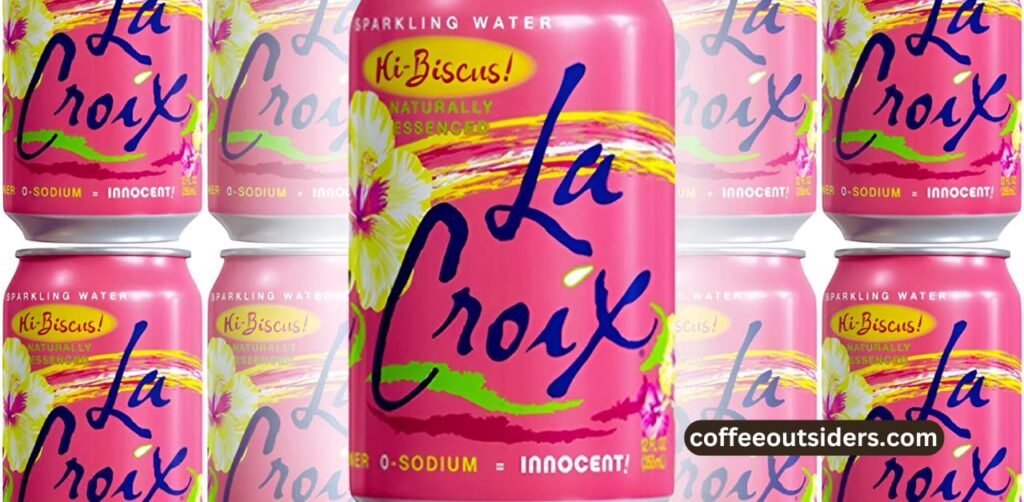
1. Understanding Caffeine in Beverages
Caffeine is a central nervous system stimulant most often associated with natural products such as coffee, tea, soft drinks and energy drinks. It does this by stimulating the central nervous system, which is why many people use caffeine to feel more alert and focused. The major reason is that caffeine provides an immediate energy boost.
Drinking it later in the day could affect your sleep cycle. Whether in small or large amounts, they can impact natural sleep cycles, resulting in restless nights or trouble falling asleep. For those monitoring their health, knowing the caffeine content in drinks is essential.
Caffeinated beverages are often falsely blamed for dehydration since caffeine is a diuretic, which drives fluid loss. Conversely, water or non-caffeinated, naturally carbonated beverages encourage hydration without causing this impact. Making smart beverage choices is the key to having it all, particularly for those of us who react to caffeine or want to consume less.
2. Why This Beverage Is Caffeine-Free
For anyone looking for a caffeine-free alternative, La Croix is a go-to. Its unique formulation contains only carbonated water and natural flavors from fruit & plant oils. The beverage provides a functional and refreshing lift.
It accomplishes all this without the stimulating effects of caffeine that are present in other beverages. This makes it an ideal choice for children, adults, or anyone looking to eliminate caffeine from their diet completely.
The brand further embraces health and simplicity by excluding stimulants or anything else frivolous. La Croix appeals to consumers looking for healthier, refreshing options. Ginger ale makes a great choice for a flavorful, bubbly drink without the sugar and calories that don’t fit into a healthy lifestyle.
Drinking even one or two sugary sodas a day can wreak havoc on your health. Naturally carbonated sparkling waters like La Croix and Perrier have zero bad stuff, making them a guilt-free alternative to a sugary soda.
3. Benefits of Choosing Caffeine-Free Drinks
The advantages of having caffeine-free beverages are numerous. One of the biggest benefits of cutting out caffeine is better sleep, since not consuming caffeine means you’re less likely to experience restlessness or insomnia.
Caffeine-free alternatives, such as La Croix, can further reduce anxiety, as they do not psychically stimulate the nervous system. This allows them to be a relaxation option at any time of the day.
The other advantage is hydration. Non-caffeinated beverages, such as La Croix, encourage healthy hydration practices without the risk of negative effects. For anyone tired of drinking boring old water, La Croix is a delicious and flavorful, naturally hydrating option.
It’s calorie-free, so it’s the perfect choice for people on a calorie budget or looking for a healthier beverage to enjoy every day. Free of caffeine and other unhealthy ingredients, La Croix is the healthier choice you can feel good about drinking every day.
Ingredients and Nutritional Information
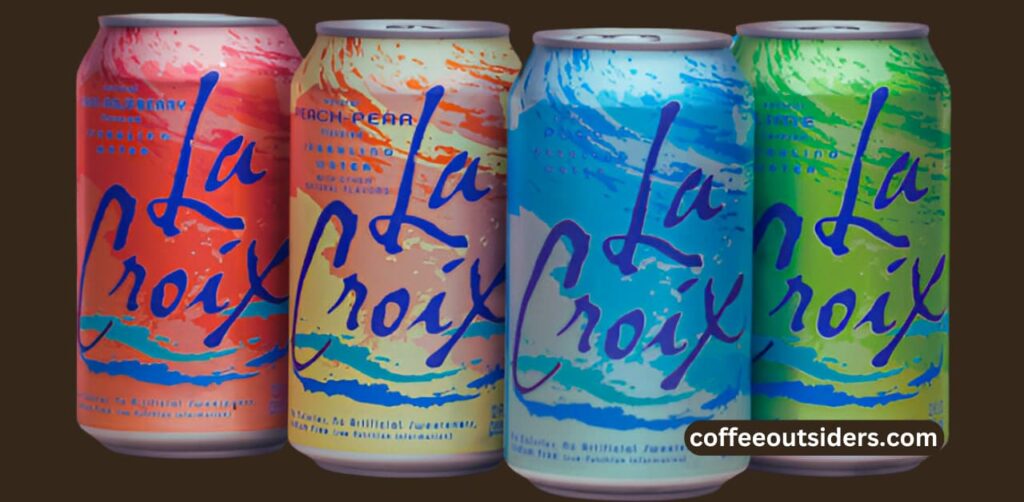
List of Ingredients in the Beverage
La Croix Sparkling Water stands out with one of the most simple and clear-cut ingredient lists we’ve come across. Here’s a breakdown:
- At its foundation, La Croix consists of locally-sourced water that undergoes rigorous filtration processes, such as reverse osmosis and deionization. Each of these steps purify water of all impurities and additives, part of the brand’s long-standing commitment to quality.
- The flavors in La Croix come from natural essence oils, which are extracted from fruits corresponding to the flavor listed on the can. For instance, the lime flavor is made with oils from actual limes. These essences are non-GMO, keeping the product’s natural integrity intact.
- Citric acid (in select flavors): This is used sparingly to add a slight tartness to certain varieties. However, citric acid is not used in every flavor, allowing for a more neutral taste profile for consumers looking to avoid the ingredient.
Most importantly, La Croix contains no artificial sweeteners, sugars or preservatives in any of its formulations. That absence is what makes it so special. Unlike most other drinks, it truly doesn’t rely on artificial ingredients to enhance taste or preservative qualities.
With no hidden ingredients, what you see is what you get.
Nutritional Facts and Health Insights
La Croix’s nutritional profile is just as clean as its ingredient list, making it a guilt-free refreshment option among soda alternatives. The beverage has no calories, which is perfect for the calorie-conscious consumer. Unlike conventional sodas and juice drinks, La Croix has little to no artificial ingredients. It’s made without any added sugars or sweeteners, reflecting its commitment to using only natural flavorings.
The health benefits of this newfound simplicity are impressive. By drinking beverages free from artificial additives, you help reduce your exposure to synthetic chemicals. Numerous studies show that these harmful chemicals can cause long-lasting health effects, especially those found in typical beverages.
The health benefits of this newfound simplicity are impressive. By drinking beverages free from artificial additives, you help reduce your exposure to synthetic chemicals. Numerous studies show that these harmful chemicals can cause long-lasting health effects.
Hydration might be the most underrated benefit of La Croix. The carbonated water gives you the same hydrating benefits you get from plain water, but with a fun fizzy twist, making it a refreshing beverage option.
Hydration might be the most underrated benefit of La Croix. The carbonated water gives you the same hydrating benefits you get from regular water, but with a fun fizzy twist.
Overall, La Croix stands out as a friendly soda alternative, offering a delightful experience without the guilt associated with traditional cola drinks.
Sourcing and Filtration Process
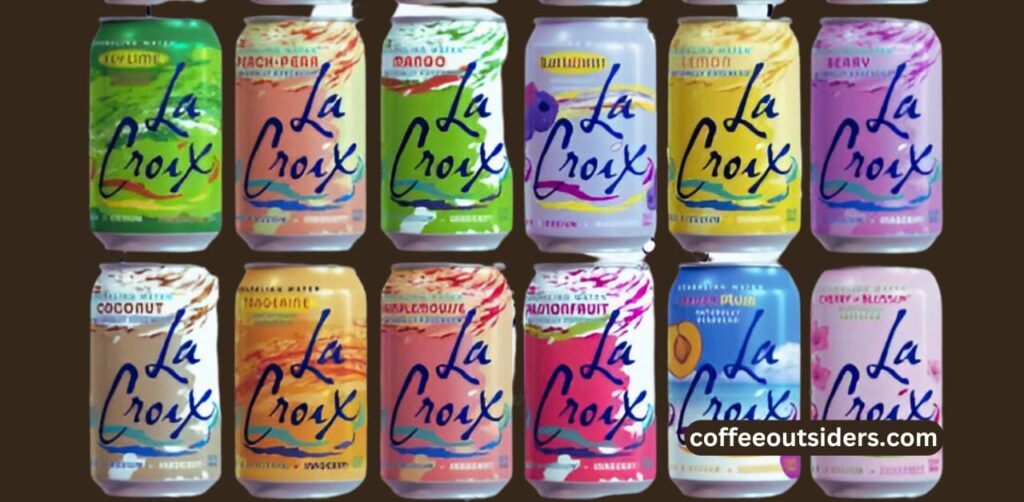
How the Beverage Is Sourced
LaCroix’s sourcing process starts with a focus on plain water. Although the brand does not directly disclose where its water comes from, it ensures that the stringent sourcing and selection process fulfills rigorous quality standards. Emphasizing quality is crucial for any sparkling water brand.
The base of any good carbonated beverage is its water, and the purity of that water significantly affects the taste. LaCroix water originates from natural springs throughout the United States. Next, it treats that water in one of its 12 bottling plants across the country. This deep production ecosystem allows for nationwide availability, albeit without the romanticized, single-source origin story that some brands may tout.
A key factor in LaCroix’s sourcing is the use of natural fruit essences. These essences, which are oils or extracts from fruits, come from established suppliers. It’s a meticulous process of artfully capturing those aromatic compounds found in fruits, ensuring they remain 100% natural – with no artificial color or flavor, making it a friendly soda alternative.
The brand labels its flavorings as “natural.” The label doesn’t tell you what’s in those components. While this method may be convenient for the food industry, it has raised a flag for transparency.
Sustainability has a hand in LaCroix’s ingredient sourcing as well. Their parent company, National Beverage Corp, is committed to sustainability, focusing on reducing the impact of operations on the environment. The brand seeks to use locally sourced ingredients, as available.
This sourcing strategy, paired with a simplified production process, helps satisfy growing consumer demand for environmentally friendly products. This commitment goes hand-in-hand with environmental justice goals. It further improves the brand’s reputation with consumers that increasingly make sustainability a factor in their buying decisions.
LaCroix’s overall flavor profile is immediately elevated by its obsessive sourcing. Pure, high-quality water and natural essences come together to create a clean, refreshing taste with no added sugars or artificial ingredients. It’s LaCroix’s commitment to quality that makes it a leader in the rapidly growing sparkling water category.
With rising consumer demand, this dark fiber market is forecast to grow immensely in the coming years.
Filtration Methods for Purity
LaCroix goes further to protect the purity of its water with an extensive 10-step filtration process. Filtration is especially important since even small trace impurities may change the flavor profile of sparkling water. The brand employs these multi-step filtration processes to produce the clean, crisp, neutral base needed for its complex, savory beverages.
One primary technique, reverse osmosis, is particularly adept at getting rid of a wide variety of contaminants— minerals, microbes, and other undesirables. This process uses a semi-permeable membrane to remove particles large and small, producing pure water.
The beverage industry has long celebrated reverse osmosis as a miracle solution. It offers such a neutral water profile that the natural fruit essences in LaCroix can really shine.
Upholding exacting standards throughout the filtration process is what guarantees the high quality you expect with every can of LaCroix. This kind of consistency is absolutely essential to consumer trust, because the taste and quality needs to be right on the mark, every single time.
By concentrating on purity, LaCroix is able to provide a sparkling water product that is light, crisp, and free from any artificiality or aftertaste. This dedication to the sourcing and filtration process is reflected in the company’s brand promise of delivering a clean, crisp beverage experience.
Differences Between Sparkling Waters
When you look closely at sparkling water brands, one key distinction stands out: whether or not they contain caffeine. This distinction shapes not just their function, but also their attraction as a refreshing beverage option to the diverse tastes and lifestyles of today’s consumers.
Caffeinated Versus Non-Caffeinated Sparkling Waters
Caffeinated sparkling waters, like Olipop and AHA, contain caffeine, giving you an extra pick-me-up. These beverages are designed for consumers looking for a refreshing pick-me-up that’s a better choice than coffee or energy drinks. Brands like AHA offer fun caffeinated varieties too, like their Citrus + Green Tea flavor.
These delicious drinks are the ultimate merger of hydration and an energizing kick. In contrast, non-caffeinated options like La Croix are crafted purely for refreshment and don’t have the stimulating effect. These beverages cater better to consumers looking for relaxation or hydration rather than energy.
Sparkling waters made with caffeine are entirely different from those without. Drinks that contain caffeine typically have richer or deeper flavors to balance out the caffeine’s bitter kiss. That’s where the non-caffeinated options, like Bubly, really shine with their sparkling waters.
Savor the crisp flavors of Cherry or Lime for a simple, clean, refreshing taste! The lack of caffeine opens it up to be more sweet or fruity, which is more broadly appealing.
Health considerations only further emphasize the rift between these categories. High doses of caffeine may cause such side effects as an accelerated heart beat, nervousness, or insomnia. If you’re someone who pays close attention to your daily intake, non-caffeinated sparkling waters offer an easy option without the concern.
La Croix is interestingly both caffeine-free and calorie-free. This accountability goes a long way in making seltzer a healthier choice than other sugary beverages, which are one of the largest sources of added sugars in our diets.
With consumers seeking healthier beverage choices, non-caffeinated sparkling waters have increased in popularity. Brands such as La Croix and Perrier have been more than happy to satisfy this growing demand with bold, assertive flavors and individual mineral makeups.
Perrier, with its crisp taste and subtle mineral notes, stands out as a premium choice, while La Croix’s colorful packaging and wide flavor range make it a household favorite.
Factors That Influence Sparkling Water Choices
When deciding on sparkling water, it’s not as simple as it seems. Flavor is usually the first thing listed. Innovative brands such as Aura Bora are getting attention for using real herb, flower and fruit extracts.
This technique provides a fuller flavor profile than other flavored sparkling waters. In much the same way, Hal’s Seltzer Water delivers a harsher, more aggressive sparkle – ideal for the consumer searching for that fizzy jolt.
Consumers are largely abandoning sugary sodas and sweetened beverages. To counteract this, caffeine-free sparkling waters, such as La Croix, are emerging as a popular alternative.
These beverages make it easy to satisfy your cravings without worrying about harmful ingredients so you can sip refreshing deliciousness guilt-free. Among them, Topo Chico cuts a memorable figure with its iconic glass bottles and almost shocking fizz.
This on-trend sparkling water is the perfect option for health-conscious consumers and makes a great mixer for cocktails, too.
Taste and variety are just as important. Bubly’s diverse lineup of flavors ensures there’s something for everyone, whether you prefer the tang of Grapefruit or the sweetness of Blackberry.
From cran-raspberry to passionfruit, La Croix has a sparkling water flavor to suit everyone’s taste buds. From Passionfruit to Tangerine, there’s a flavor for every adventurous—or more traditional—taste bud.
Marketing is what makes us think there is a difference between these options. Brands focused on health, sustainability, or bold, authentic flavors that stand out from the crowd always strike a chord with today’s consumers.
La Croix has developed a national following as a calorie-free, hip, colorful, tasty beverage. This aspirational image is why it has become a go-to for consumers seeking healthier beverage alternatives.
Alternatives to This Beverage
When it comes to caffeine-free sparkling waters, there’s no shortage of options for those seeking refreshing beverage options and soda alternatives to La Croix. Exploring these alternatives can expose you to amazing new flavors and tastes, showcasing the carbonated goodness that you never knew you loved!
Popular Non-Caffeinated Sparkling Water Brands
Here’s a list of well-loved sparkling water brands, all of which offer caffeine-free options:
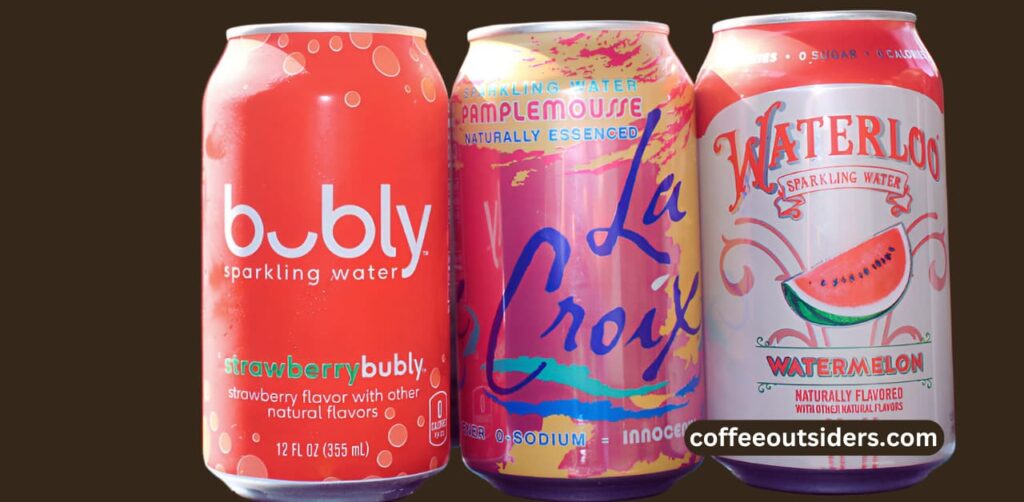
- Bubly offers simple, vibrant flavors like Lime, Mango, and Strawberry. Fruity fans rejoice—this one’s for you. It’s super refreshing with a pure, clean taste and no added sugar.
- This classic mineral water brand has a slight natural carbonation and a touch of sophistication. From Lemon to Peach, Perrier offers delicate taste experiences, but can be enjoyed as a mixer with other drinks.
- Unique for its use of real fruit juice, Spindrift stands out with flavors like Raspberry Lime and Pineapple. Whether you’re looking to reduce your processed ingredients, or not, this is a solid option.
- Topo Chico: Known for its intense carbonation, Topo Chico is perfect for those who love a sharp, fizzy kick. Its mineral-rich composition gives it a unique flavor profile.
- AHA combines creative flavor pairings like Blueberry Pomegranate or Lime Watermelon, making it a good option for adventurous drinkers.
- With its sparkling mineral water base and Italian roots, San Pellegrino offers both plain and fruit-infused options. Its Blood Orange and Lemon flavors are hot sellers.
- This brand emphasizes bold, vibrant flavors such as Black Cherry, Peach, and Vanilla Cream. Its vigorous carbonation and very minimalist ingredient list win over the hardcore flavor fanatics.
With so many brands, flavors, and options, the sparkling water market has something for everyone.
Exploring Other Non-Caffeinated Options
Experimenting with new brands is an exciting way to find your new favorite, so keep an open mind and have fun! Each features different flavor profiles and levels of carbonation, so you can customize your selection to suit your mood or pairing.
Reading labels is the best way to make sure your choice is caffeine-free and fits your dietary needs. Most alternatives, including Spindrift, use few ingredients, which is great if you’re trying to steer clear of added sugars or other processed additives.
Non-caffeinated sparkling waters can support a balanced diet by providing hydration without the calories or sugars found in sodas and other drinks. A study from the American Journal of Clinical Nutrition found that sparkling water was as hydrating as still water.
This is what makes sparkling water a great replacement for sugary drinks.
Choosing the Right Sparkling Water for You
What makes the best sparkling water for you will ultimately come down to your individual preferences and wellness priorities. If you want something a little more plain, go for a mineral water without a strong flavor, like Topo Chico or Perrier.
If you’re into bolder, fruitier profiles, brands such as Waterloo or AHA may be a better choice for you.
Brands like Spindrift that use actual fruit are equally awesome choices. For budget-conscious shoppers looking to make the switch, Target’s Good & Gather Sparkling Water hits the sweet spot between low prices and high quality.
Additionally, experimentation is encouraged—make sure to try out different flavors and brands to figure out what will pair best with your customers’ palates.
So keep enjoying your citrusy sparkling waters, especially at mealtime! This will help minimize your exposure to acidity and preserve your teeth’s health. Doing so, according to the ADA, can have long-term benefits by helping to protect your teeth.
Conclusion
La Croix is a fierce competitor even among other caffeinated types, making it a great pick for anyone seeking a caffeine-free beverage. The simple formula consists of carbonated water and natural flavors. This refreshing alternative has zero sweeteners or synthetic ingredients. Its filtration process and variety of flavors offer something for everyone, whether you want a crisp sip on a hot day or a fizzy addition to meals.
If you’re exploring alternatives, there are plenty of sparkling waters and flavored beverages out there, but La Croix keeps it light and straightforward. For those who want an enhanced hydration experience with just a hint of flavor, we recommend you keep it on hand in your refrigerator. Browse the new offerings and find out what flavor suits your fancy.
Frequently Asked Questions
Yes, La Croix does have caffeine. Since La Croix is made with carbonated water and natural fruit flavorings, it is a caffeine-free sparkling water brand alternative.
La Croix’s ingredients include carbonated water and natural flavors, making it a refreshing beverage option with zero calories and no artificial sweeteners, a friendly soda alternative for everyone.
So yes, La Croix is perfectly safe to drink every day. Being a refreshing beverage option that’s free of caffeine, sweeteners, and artificial additives, it serves as a friendly soda alternative to sugary drinks.
La Croix relies on a multi-step filtration process to guarantee the water brand is pure. Prior to carbonation and flavoring, the carbonated beverage is carefully sourced and filtered to ensure it meets high safety and quality standards.
La Croix is a refreshing beverage option that stands out as both caffeine-free and calorie-free. Unlike typical carbonated beverages, this sparkling water brand uses only natural flavorings, avoiding sugars and artificial sweeteners.
Sure, even more better-for-you alternatives have popped up, from Spindrift and Bubly to La Croix’s longtime rival Perrier. Look for refreshing beverage options like carbonated waters on the labels to discover other delightful caffeine-free, naturally flavored selections.
Does La Croix count as hydration? Plus, with no questionable ingredients, it’s a deliciously refreshing beverage option to hydrate with pure water.

